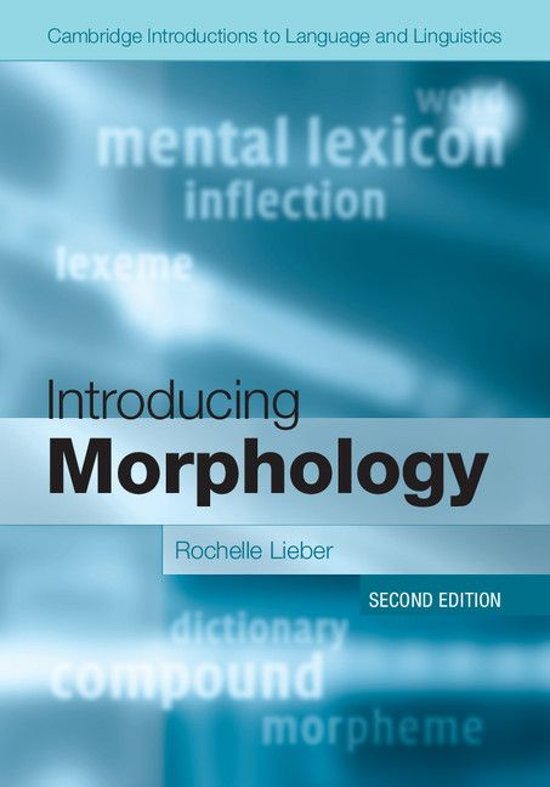Introducing morphology Study guides, Class notes & Summaries
Looking for the best study guides, study notes and summaries about Introducing morphology? On this page you'll find 32 study documents about Introducing morphology.
All 32 results
Sort by
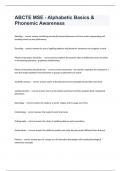
-
ABCTE MSE - Alphabetic Basics & Phonemic Awareness questions and answers 2024
- Exam (elaborations) • 7 pages • 2024
- Available in package deal
-
- $12.99
- + learn more
ABCTE MSE - Alphabetic Basics & Phonemic AwarenessBlending - correct answer combining previously learned phonemes to form words (segmenting and breaking words up into phonemes) Decoding - correct answer the use of spelling patterns and phonemic awareness to recognize a word Phonics instruction should be: - correct answer explicit; the teacher takes a deliberate course of action in introducing phoneme - grapheme relationships. Phonics instruction should also be: - correct answer syst...
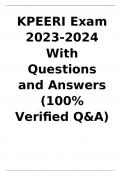
-
KPEERI Exam 2023/2024 With Questions and Answers (100% Verified Q&A)
- Exam (elaborations) • 31 pages • 2023
-
Available in package deal
-
- $14.49
- + learn more
phonology - Answer speech sound system of a language, how the sounds can be produced, sequenced, and combined to make words morphology - Answer smallest unit of meaning in a language, how the units combine to change meaning, prefixes, suffixes, base elements morpheme - Answer smallest unit of meaning phoneme - Answer smallest unit of sound semantics - Answer meanings of words, phrases, and sentences, and their relationship in a language, expressions and figurative language syntax - Answer ru...
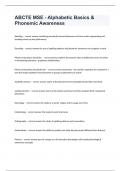
-
ABCTE MSE - Alphabetic Basics & Phonemic Awareness correctly answered graded A+
- Exam (elaborations) • 7 pages • 2024
-
Available in package deal
-
- $12.99
- + learn more
ABCTE MSE - Alphabetic Basics & Phonemic AwarenessBlending - correct answer combining previously learned phonemes to form words (segmenting and breaking words up into phonemes) Decoding - correct answer the use of spelling patterns and phonemic awareness to recognize a word Phonics instruction should be: - correct answer explicit; the teacher takes a deliberate course of action in introducing phoneme - grapheme relationships. Phonics instruction should also be: - correct answer syst...
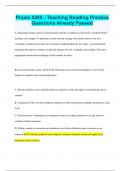
-
Praxis 5205 - Teaching Reading Practice Questions Already Passed
- Exam (elaborations) • 17 pages • 2023
- Available in package deal
-
- $9.99
- + learn more
Praxis 5205 - Teaching Reading Practice Questions Already Passed A sixth-grade teacher selects several domain-specific vocabulary words from a textbook before starting a new chapter. In planning an instructional strategy, the teacher chooses the new vocabulary words because they are essential to understanding the new topic. An instructional technique that requires students to gain the deepest level of vocabulary knowledge is the most appropriate instructional technique for the teacher to select...

-
BIO 220 EXAM QUESTIONS AND ANSWERS 2024 LATEST UPDATE
- Exam (elaborations) • 32 pages • 2023
- Available in package deal
-
- $15.49
- + learn more
Know the definition of microbe and discuss the contradictions that arise from the word microbe. Microbe: a living organism that requires a microscope to be seen Exceptions/ probs with def: (look in notebook for more detail) 1. Supersize Microbial Cells 2. Microbial Communities 3. Viruses Provide examples of microbes that profoundly affected human history. 1717- First sign of immunization for small pox. 1929- Alexander Fleming discovered penicillin. 14th century- bubonic plag...
![[BIO 210B] Exam #1 (SOLVED)](/docpics/3265829/64de6c9c2bf85_3265829_121_171.jpeg)
-
[BIO 210B] Exam #1 (SOLVED)
- Exam (elaborations) • 4 pages • 2023
- Available in package deal
-
- $9.69
- + learn more
What is biodiversity? correct answers the diversity of life What are the three levels of biodiversity? correct answers genetic diversity, species diversity, and ecosystem diversity What are the major benefits of biodiversity to our species? correct answers plants are a great benefactor for medicine (sources for pharmaceutical and other chemicals), as well as providing oxygen to the environment pollinators (like the fruit-fly bat are beneficial for spreading, or dispersing pollen) bacter...
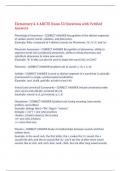
-
Elementary k-6 ABCTE Exam 53 Questions with Verified Answers,100% CORRECT
- Exam (elaborations) • 5 pages • 2023
-
Available in package deal
-
- $11.39
- + learn more
Elementary k-6 ABCTE Exam 53 Questions with Verified Answers Phonological Awareness - CORRECT ANSWER Recognition of the distinct segments of spoken sound: words, syllables, and phonemes. (Example: Kitty: composed of 4 distinct sounds (or Phonemes: /k/ /i/ /t/ and /e/ Phonemic Awareness - CORRECT ANSWER Recognition of phonemes, abiltiy to segment words into constituent phonemes, ability to blend phonemes and substitute phonemes to make new words. (Example: /k/ in kitty can also be used ...
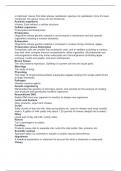
-
Acellular organisms Viruses. Exist without a cellular structure. Cellular organisms Prokaryotes and Eukaryotes. Prokaryotes Organisms whose genetic material is not enclosed in membrane and lack specific organelles including a nucleus (bacteria). Eukaryote
- Exam (elaborations) • 18 pages • 2024
-
- $11.49
- + learn more
Acellular organisms Viruses. Exist without a cellular structure. Cellular organisms Prokaryotes and Eukaryotes. Prokaryotes Organisms whose genetic material is not enclosed in membrane and lack specific organelles including a nucleus (bacteria). Eukaryotes Organisms whose genetic material is enclosed in nucleus (fungi, protozoa, algae). Prokaryotes versus Eukaryotes Prokaryotic cells are smaller than eukaryotic cells, and in addition to lacking a nucleus, they lack other complex interna...
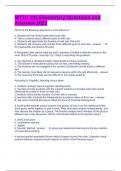
-
MTTC 103 Elementary Questions and Answers 2023
- Exam (elaborations) • 46 pages • 2023
-
Available in package deal
-
- $25.99
- + learn more
MTTC 103 Elementary Questions and Answers 2023 Which of the following objectives is most effective? a. Student will read three books about wild cats. b. Talk to students about different types of wild cats. c. Students will appreciate the diversity of wild cats that exist. d. Students will compare and contrast three different types of wild cats. D; it's measurable and student-focused. A first-grade class cannot meet the unit's objective of writing a reflective essay on the book ...

-
Rica quiz 2 Questions and Answers 2023
- Exam (elaborations) • 8 pages • 2023
-
Available in package deal
-
- $21.49
- + learn more
Rica quiz 2 Questions and Answers 2023 He is ___________ to get that from the carnival stand. (twirny, flogging, shoor) Subconsciously using inferential grammar in reading A fifth grade teacher provides her students with an easier science article with easier vocabulary about the topic of asteroids before reading from the actual science textbook. What is the teacher trying to achieve? Possible pre teaching/preloading information to familiarize students with content and vocabulary __ ...

That summary you just bought made someone very happy. Also get paid weekly? Sell your study resources on Stuvia! Discover all about earning on Stuvia

